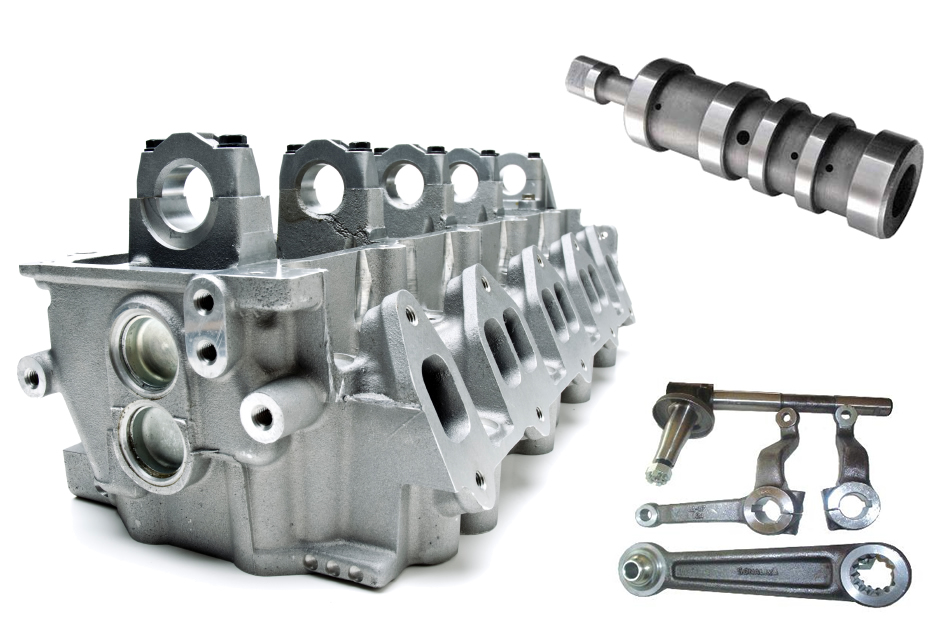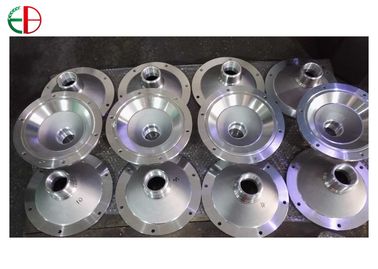Exactly How Aluminum Foundries Add To Different Industries: A Thorough Review
Light weight aluminum shops offer as important providers throughout multiple sectors, including automotive, aerospace, building, and electronic devices. They generate components that are not just light-weight yet likewise sturdy, improving the performance of various products. With innovative casting techniques and a dedication to sustainability, these foundries are adjusting to fulfill developing sector needs. As they introduce, the impact of light weight aluminum spreadings on various applications increases important questions regarding the future of manufacturing. What lies in advance for this essential market?
The Role of Aluminum Foundries in the Automotive Market
As the automotive industry increasingly welcomes lightweight products to boost gas effectiveness and performance, light weight aluminum factories play a critical duty in this advancement. These centers concentrate on the production of light weight aluminum spreadings, which are necessary components in modern-day lorries. By giving high-strength, lightweight components, aluminum shops make it possible for makers to lower the total weight of vehicles, ultimately leading to enhanced gas economic situation and lowered exhausts.
Aluminum's resistance to rust better improves lorry long life, making it an eye-catching choice for automakers. Factories use innovative methods such as die casting and sand casting to develop detailed and exact components, guaranteeing that they meet rigorous sector criteria. In addition, the capacity to recycle aluminum efficiently contributes to a much more lasting production process. As the automobile field proceeds to innovate, light weight aluminum factories will certainly stay pivotal in delivering the materials required for the next generation of cars, sustaining both performance and ecological goals.

Aerospace Applications of Aluminum Castings
Light weight aluminum spreadings are essential to the aerospace industry, offering a mix of lightweight stamina and sturdiness that is critical for airplane efficiency. These spreadings are made use of in various parts, such as engine components, architectural frames, and landing equipment, where weight decrease is important for gas effectiveness and total safety. The flexibility of aluminum enables for complex geometries that boost aerodynamic performance while keeping structural integrity.
Advancements in casting modern technologies have actually enhanced the accuracy and surface finish of light weight aluminum components, minimizing the need for considerable post-processing. This efficiency not just increases production timelines however likewise decreases costs, making light weight aluminum an eye-catching selection for producers. The corrosion resistance of light weight aluminum assurances durability and reliability in harsh operating atmospheres, better establishing its function in aerospace applications. As the sector advances, light weight aluminum spreadings continue to be a vital product, driving innovation and supporting the development of next-generation airplane.
Construction Industry Advancements Via Light Weight Aluminum
The construction industry has significantly adopted light weight aluminum as a result of its lightweight residential or commercial properties and versatility, paralleling its effective applications in aerospace. Technologies in aluminum layout have actually led to stronger, more reliable frameworks, enabling architects and building contractors to explore brand-new possibilities. The product's resistance to deterioration and low maintenance requires make it especially appealing for both industrial and residential tasks.
Aluminum's versatility promotes the production of complex styles, permitting visual improvements that were previously difficult with standard products. Prefabrication strategies have actually also evolved, making use of aluminum to minimize building and construction time and costs significantly. Furthermore, the energy efficiency of light weight aluminum systems-- such as home window structures and roof-- adds to sustainable structure methods, lining up with contemporary environmental standards. As the building and construction market remains to welcome these advancements, aluminum's duty is expected to broaden, driving more development and adding to the development of resistant facilities.
Electronics and the Need for Lightweight Aluminum Parts
With the fast improvement of innovation, the need for light-weight aluminum parts in the electronic devices sector has actually surged. As gadgets end up being extra portable and small, makers look for materials that provide both durability and weight decrease. Light weight aluminum, with its exceptional strength-to-weight proportion, has emerged as a recommended option for elements such as casings, warm sinks, and architectural assistances.
Using aluminum not just enhances item performance yet additionally adds to power performance, as lighter tools call for less power during operation. In addition, aluminum's exceptional conductivity makes it perfect for digital applications, making sure effective heat dissipation and minimizing the danger of overheating.
As consumer preferences shift towards streamlined and light-weight devices, light weight aluminum foundries play a crucial duty in satisfying the advancing demands of the electronics sector (Aluminum Casting Company). Their capability to create top notch and precise aluminum elements sustains technology, enabling manufacturers to press the borders of style and functionality
Lasting Practices in Aluminum Foundries
As the electronics industry progressively focuses on sustainability, light weight aluminum shops are adapting their practices to align with these environmental goals. Numerous foundries are executing recycling programs that reclaim light weight aluminum scrap, substantially minimizing the demand for basic materials and minimizing waste. By using energy-efficient modern technologies, these centers are decreasing their carbon footprint; as an example, using electric heating systems as opposed to conventional gas-fired ones can cause considerable energy financial savings.
Furthermore, light weight aluminum shops are spending in water conservation steps, such as closed-loop systems that reuse water used in cooling down processes. These methods not just reduced water consumption yet additionally mitigate the ecological influence connected with wastewater discharge. In addition, lots of shops are discovering renewable resource resources, such as solar and wind power, to satisfy their energy needs sustainably. Through these initiatives, light weight aluminum foundries exemplify a dedication to environmental stewardship while proceeding to fulfill the needs of the electronics industry.
Future Patterns in Aluminum Shop Technologies
Emerging technologies are positioned to change light weight aluminum foundries, enhancing effectiveness and item quality while progressing sustainability initiatives. Advancements such as expert system and device knowing are anticipated to optimize manufacturing processes by forecasting tools failings and improving source allotment. The integration of sophisticated robotics will improve procedures, reducing labor expenses and decreasing human error.
Additive production, or 3D printing, is likewise obtaining traction, enabling the production of intricate geometries that were formerly unattainable with standard methods. This change might lead to significant material financial savings and lowered waste. In addition, smart shops making use of IoT (Internet of Things) modern technologies will allow real-time surveillance and data analysis, cultivating positive decision-making.
Finally, the fostering of cleaner melting innovations and reusing methods will certainly better reduce the ecological impact of light weight aluminum factories, making them a lot more sustainable. Collectively, these trends signify a future where aluminum factories can operate with browse around these guys better performance and duty.
Frequently Asked Questions
What Are the Environmental Influences of Aluminum Foundries?

Exactly How Do Foundries Guarantee High Quality Control in Light Weight Aluminum Spreading?
Factories assure quality assurance in light weight aluminum spreading by applying strenuous inspection procedures, utilizing advanced innovation, carrying out routine product testing, and adhering to market standards, consequently look at more info preserving uniformity and integrity in their ended up items. Precision aluminum casting.
What Is the Average Life-span of Light Weight Aluminum Cast Components?
The average lifespan of aluminum cast parts usually ranges from 10 to 50 years, relying on factors such as environmental problems, usage, and upkeep. Correct care can substantially improve their longevity and efficiency with time.
Exactly How Are Light Weight Aluminum Alloys Selected for Particular Applications?
Light weight aluminum alloys are chosen based on factors such as toughness, rust resistance, weight, and thermal conductivity. Engineers assess the particular needs of applications to identify the most ideal alloy for finest performance and toughness.
What Are the Safety Laws for Light Weight Aluminum Foundry Workers?
Security laws for light weight aluminum foundry employees include personal protective devices mandates, air flow demands, exposure limitations to dangerous materials, and methods for managing molten metal. Compliance assurances employee safety and reduces health threats connected with shop operations.
As the automotive sector significantly embraces lightweight materials to improve fuel efficiency and efficiency, aluminum shops play a vital duty in this advancement. As customer preferences shift in the direction of sleek and lightweight gadgets, get more light weight aluminum shops play a vital duty in fulfilling the developing demands of the electronic devices industry. As the electronics industry increasingly prioritizes sustainability, aluminum shops are adjusting their methods to line up with these ecological objectives. Many factories are applying recycling programs that recover aluminum scrap, greatly lowering the need for raw products and reducing waste. Security guidelines for light weight aluminum factory employees consist of individual safety devices requireds, ventilation demands, exposure limitations to dangerous products, and procedures for handling molten steel.